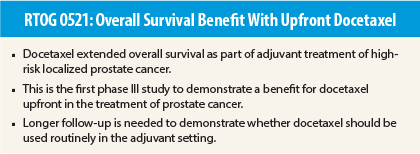For the first time, a large randomized trial has suggested that overall survival is improved by the addition of adjuvant chemotherapy to androgen suppression and radiotherapy in men with localized, high-risk, hormone-sensitive prostate cancer. Docetaxel has been used to treat metastatic hormone-resistant prostate cancer for a number of years, and this new study—RTOG 0521—suggests that moving it up earlier in the course of treatment to the adjuvant setting may extend the lives of men with high-risk, hormone-sensitive prostate cancer.1
Results of RTOG 0521 are part of an emerging story, suggesting that docetaxel can be used earlier in the course of disease. Both the CHAARTED2 and STAMPEDE3 trials found that docetaxel improved survival in men with high-risk metastatic hormone-sensitive prostate cancer, whereas before these trials, docetaxel was confined to the hormone-resistant metastatic setting.
RTOG 0521 was designed to assess 4-year survival, and the authors believe that with longer follow-up, the overall survival benefits of adjuvant docetaxel in this setting will continue to emerge.
“We hypothesized that chemotherapy, known to be beneficial in metastatic hormone-resistant prostate cancer, would improve outcomes in nonmetastatic hormone-sensitive prostate cancer. This is the first study to show the potential benefit in [overall] survival of adjuvant docetaxel. These were high-risk patients with aggressive cancer. For the right patient, these data justify adding docetaxel. This 4-year analysis is relatively early, and additional follow-up will likely be enlightening,” said lead author Howard Sandler, MD, of Cedars-Sinai Medical Center, Los Angeles.
“We have seen continued separation of the survival curves in CHAARTED and STAMPEDE, and we look forward to sharing later results of RTOG 0521,” Dr. Sandler said.
At a press conference where these data were discussed, ASCO expert Charles Ryan, MD, said, “This is the first study to demonstrate a survival benefit for high-risk localized prostate cancer with chemotherapy as adjuvant therapy plus androgen-deprivation therapy and radiation. The follow-up is relatively short, but there is significant separation of the survival curves at 5 to 6 years, and we would expect that to continue with longer follow-up. This is treatment with curative intent.” Dr. Ryan is Clinical Program Leader for Genitourinary Medical Oncology at the University of California San Francisco, Helen Diller Family Comprehensive Cancer Center.
Study Details
RTOG 0521 enrolled 563 eligible patients between December 2005 and August 2009 and randomized them to either arm 1 (androgen suppression and radiotherapy) or arm 2 (androgen suppression, radiotherapy, docetaxel, and prednisone [10 mg]). Androgen suppression was given for 24 months; external-beam radiation therapy was given for 8 weeks; and docetaxel was given at 75 mg/m2 on day 1 for 6 cycles, starting 4 weeks after the completion of radiotherapy.
Patients included in the trial had Gleason scores between 8 and 10, prostate-specific antigen (PSA) ≥ 20 ng/mL, or ≥ T2 stage. The median age was 66 years. The median PSA level was 15.1 ng/mL; 53% had Gleason scores of between 9 and 10; 31% had a Gleason score of 8; 16% had a Gleason score of 7; and 33% had node-negative disease.
Dr. Sandler emphasized that the study was designed to detect an improvement in 4-year overall survival from 86% to 93% or a 51% relative reduction (hazard ratio = 0.49) in the yearly death rate. The investigators used a one-sided P value of .05 and 90% power, requiring at least 78 deaths and 486 cases for the primary analysis.
At a median follow-up of 5.5 years, 4-year overall survival was 89% in arm 1 and 93% with docetaxel, for an absolute benefit of 4% (one-sided P value of .04). This represented a 30% reduction in risk of death favoring adjuvant docetaxel.
A substantial reduction in disease-free survival (disease-free survival, recurrence, or death from any cause) was observed with the addition of docetaxel: At 6 years, the rate of disease-free survival was 65% in arm 1 vs 55% in arm 2, for an absolute 10% difference between the 2 arms (P = .04).
Docetaxel also achieved a reduction in distant metastases at any time during the trial compared with androgen suppression and radiotherapy alone; 41 events were observed in arm 1 and 26, in arm 2. The risk of biochemical failure was reduced by 20% in the docetaxel-containing arm.
Deaths due to cancer were reported in 23 patients in arm 1 vs 16 patients in arm 2. Other causes of death included second primary cancer (12 in arm 1 and 5 in arm 2), protocol treatment (0 vs 2, respectively), and unknown (0 vs 4, respectively). Adverse events were as expected, with more grade 3 and 4 hematologic toxicity in the docetaxel arm.
Published just prior to the ASCO Annual Meeting, the GETUG 12 trial found that docetaxel-based chemotherapy improves relapse-free survival in patients with high-risk localized prostate cancer.4 These investigators stressed that longer follow-up is needed to determine whether such therapy also improves metastasis-free or overall survival. ■
Disclosure: This study was funded by the National Cancer Institute. Dr. Sandler has served as a consultant or advisor to AstraZeneca, Bayer, Eviti, Janssen Pharmaceuticals, and Medivation/Astellas; and has received research funding from Myriad Genetics. Dr. Ryan reported no potential conflicts of interest.
References
1. Sandler HM, Hu C, Rosenthal SA, et al: A phase III protocol of androgen suppression and 3DCRT/IMRT versus AS and 3DCRT/IMRT followed by chemotherapy with docetaxel and prednisone for localized, high-risk prostate cancer (RTOG 0521). 2015 ASCO Annual Meeting. Abstract LBA5002. Presented May 31, 2015.
2. Sweeney C, Chen YH, Carducci MA, et al: Impact on overall survival with chemohormonal therapy versus hormonal therapy for hormone-sensitive newly metastatic prostate cancer: An ECOG-led phase III randomized trial. 2014 ASCO Annual Meeting. Abstract LBA2.
3. James ND, Spears MR, Clarke NW, et al: Survival with newly diagnosed metastatic prostate cancer in the ‘docetaxel era’: Data from 917 patients in the control arm of the STAMPEDE trial (MRC PR08, CRUK/06/019). Eur Urol 67:1028-1038, 2015.
4. Fizazi K, Faivre L, Delva R, et al: Androgen deprivation therapy plus docetaxel and estramustine versus androgen deprivation therapy alone for high-risk localised prostate cancer (GETUG 12): A phase 3 randomised controlled trial. Lancet Oncol. May 28, 2015 (early release online).




